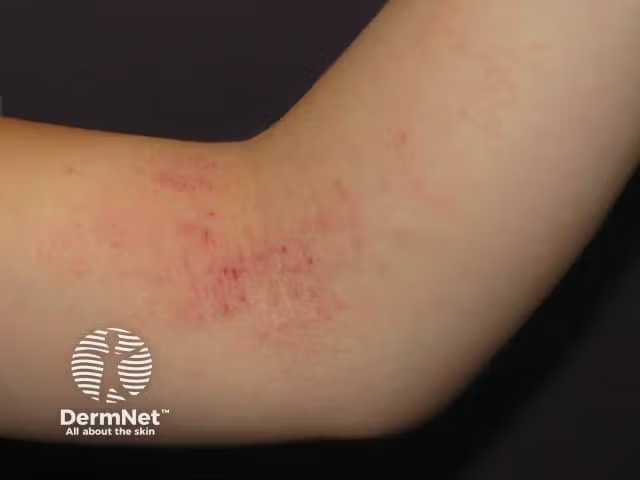- Case-Based Roundtable
- General Dermatology
- Eczema
- Chronic Hand Eczema
- Alopecia
- Aesthetics
- Vitiligo
- COVID-19
- Actinic Keratosis
- Precision Medicine and Biologics
- Rare Disease
- Wound Care
- Rosacea
- Psoriasis
- Psoriatic Arthritis
- Atopic Dermatitis
- Melasma
- NP and PA
- Skin Cancer
- Hidradenitis Suppurativa
- Drug Watch
- Pigmentary Disorders
- Acne
- Pediatric Dermatology
- Practice Management
- Prurigo Nodularis
- Buy-and-Bill
Publication
Article
Dermatology Times
Lifestyle recommendations may curb eczema symptoms
Author(s):
Lifestyle recommendations are a complex aspect of eczema care. There are many things within in a patient's control that can impact severity and dermatologists should try to help patients identify these, one expert says.
There are many things within a patient’s control that can impact eczema severity. It’s important that dermatologists help patients zero in on these, according to Peter A. Lio, M.D., clinical assistant professor of Dermatology and Pediatrics at Northwestern University Feinberg School of Medicine and founding partner, Medical Dermatology Associates of Chicago.
Lifestyle recommendations are an interesting and complex aspect of eczema care,says Dr. Lio, a speaker for the National Eczema Association. Age, for example, can greatly impact a patient’s willingness or ability to make lifestyle changes aimed at relieving symptoms of eczema. A challenge for many dermatologists is that so much of the eczema they see affects children under age two years. And for these patients, there are far fewer lifestyle options that could make an impact; yet, it’s generally much easier to change babies’ and toddlers’ lifestyles, Dr. Lio says.
Factors that can contribute significantly to eczema severity include sweating, exposure to chemicals or changing environments and stress, according to Dr. Lio. Determining which specific lifestyle factors - diet, exercise, environment - impact which patients is the hard part because it can vary from patient to patient, according to Dr. Lio.
“Stress often gets forgotten about, but there is very impressive evidence that it is part of the vicious cycle: stress worsens the skin and bad skin causes stress!” he says. And, diet, in Dr. Lio’s opinion, is almost always over-analyzed.
“I often say that I wish diet were the cause. It’s pretty easy to make changes there and could save an awful lot of suffering,” he says. “But day after day, I see families who, convinced that food was the trigger, have pushed the diet into ‘unsafe’ territory and are so frustrated because they were sure it was the underlying cause, yet they continue to suffer.”
That is not to say dermatologists shouldn’t encourage healthy eating. Dr. Lio says he thinks eating healthy foods, including non-processed, non-sugary foods, and even avoiding foods that in certain patients might seem to be inflammatory, such as simple carbohydrates and dairy, can be helpful.
“I just like to set realistic explanations. It is probably not the whole story. For some, the small improvements may not be worth the somewhat dramatic changes that may be required,” he says.
Based on recommendations from providers and others, patients often try things like dust mite covers, air purifiers and water filters. Do they help?
“Maybe, sometimes. But my honest opinion is that, for the vast majority of patients, these are mostly expensive distractions that help us to regain a feeling that we have some control over the disease,” Dr. Lio says. “It’s just so hard because you want to be positive and supportive and help patients feel back in control, but you also want to focus on the things most likely to help and not overwhelm people with dozens of other things to do, especially when they are already likely stretched thin.”
Sound recommendations
Dr. Lio often recommends atopic dermatitis patients get back to the basics, including with good education, good moisturization, gentle cleansing and good sleep habits. That’s where he starts.
“Appropriate use of topical steroids and incorporating non-steroidal medications when needed to keep inflammation down safely is the next step,” he says. “For those who are failing, getting another opinion, doing a skin biopsy, and/or patch testing to see if there is a component of allergic contact dermatitis are all important. Being prepared to think about phototherapy or systemic treatments for those who are still not where they ought to be is the final step. Listening intently, being available for questions or concerns, and giving a written eczema action plan also are very helpful to my practice.”
Getting back to basics can help improve aspects of patients’ lives with far-reaching quality-of-life impact. Problems with sleep, for example, can be a vicious cycle for eczema patients. Dr. Lio says poor sleep damages the skin and inflamed skin disrupts sleep.
“It’s terrible!” he says. “I think that asking about sleep is one of the most important things. You can learn very quickly how well things are going if they are sleeping better. And often patients will ask for a sleeping pill, but I usually decline and remind them: ‘If this skin treatment works like I hope and expect it to, you won’t need help sleeping.’”
Disclosures:
Dr. Lio has served as an investigator, speaker and advisor for Regeneron Sanofi Genzyme; an investigator and advisor for AbbVie and AOBiome; an advisor and speaker for L’Oreal, Pfizer, Pierre-Fabre, TopMD; and an advisor for Altus Labs, Amyris, Dermavant, Dermira, Eli Lilly, Exeltis, IntraDerm, Johnson & Johnson, Kiniksa, La Roche-Posay, LEO, Menlo, Micreos, Realm, Syncere, Theraplex, Unilever, and Verrica.







